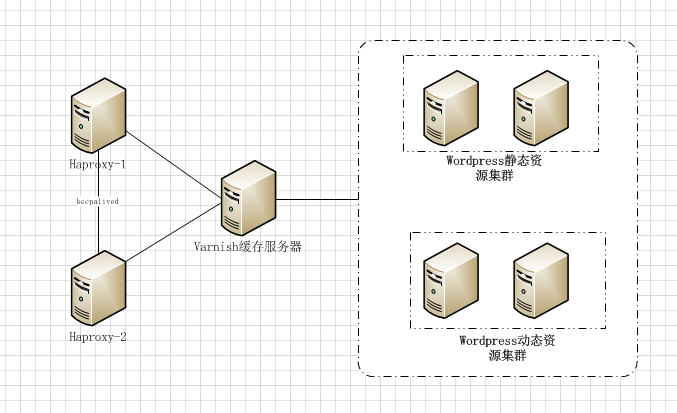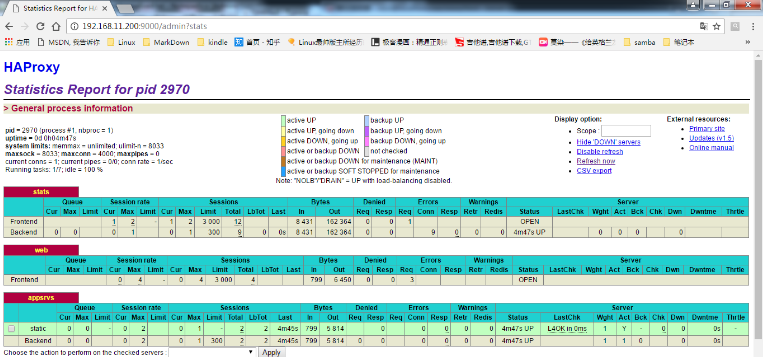haproxy和nginx都可以作为七层和四层反代服务器对外提供服务,此文通过haproxy和keealived配置varnish搭建wordpress的动静分离站点
一、实验环境
五台虚拟机:
-
haproxy-1:搭建haproxy和keepalived服务,ip地址:192.168.11.176
-
haproxy-2:搭建haproxy和keepalived服务,ip地址:192.168.11.172
-
varnish服务器ip地址:192.168.11.173
-
wordpress静态服务器:搭建httpd,ip地址:192.168.11.177
-
wordpress动态服务器,搭建httpd+php+mariadb,ip地址:192.168.11.178
实验目的:
通过haproxy访问到后台网站,并且varnish为网站提供缓存,提升网站性能。
实验拓扑:此处虚拟机数量不够,就不采用动静分离集群了,而是分别采用一台虚拟机部署:

二、实验步骤
wordpress配置:
-
动态服务器配置:
-
安装httpd,mariadb,php服务,此处php作为httpd的模块进行动态php文件处理:
yum install -y httpd mariadb-server php php-mysql php-mbstring
-
上传wordpress到/var/www/html路径下并修改属主属组为apache,此处不做详细演示;
-
-
静态服务器配置:
-
安装httpd服务并上传wordpress到/var/www/html,修改属主属组为apache;
-
varnish配置:
-
安装varnish服务并修改varnish的配置文件default.vcl,修改内容如下:
vcl 4.0; #声明为varnish4.0 import directors; #调用多个后端主机做集群# probe health_check { #定义健康状态检测机制# .url = "/.health_check.html"; #定义检测文件# .window = 5; #定义一共检测几次# .threshold = 3; #定义检测几次失败则认为后端主机失效# .interval = 2s; #每隔2秒检测一次# .timeout = 3s; #连接超时时长为3秒# } backend dynamic { #定义后端动态主机# .host = "192.168.11.178"; .port = "80"; .probe = health_check; } backend static { #定义前端主机# .host = "192.168.11.177"; .port = "80"; .probe = health_check; } sub vcl_recv { # Happens before we check if we have this in cache already. # # Typically you clean up the request here, removing cookies you don't need, # rewriting the request, etc. if (req.url ~ "(?i).*php.*") { #当访问的url包括php,则转到动态服务器,否则所有请求转到静态服务器,实现动静分离# set req.backend_hint = dynamic; } else { set req.backend_hint = static; } if (req.url ~ "(?i)(register|login)$") { #如果请求地址结尾为register或者login,注册和登录页面,则不查缓存,,直接从后端服务器获取内容# return (pass); } } sub vcl_backend_response { # Happens after we have read the response headers from the backend. # # Here you clean the response headers, removing silly Set-Cookie headers # and other mistakes your backend does. #当后端服务器回复给varnish的响应如果不包含公共缓存信息,而且请求为jpg等静态资源,则卸载cookie信息并缓存资源1小时# if (beresp.http.cache-control !~ "s-maxage") { if (bereq.url ~ "(?i).(jpg|jpeg|png|gif|css|js|xml)$") { unset beresp.http.Set-Cookie; set beresp.ttl = 3600s; } } #当varnish请求后端服务器的url包括php,则卸载cookie信息并缓存资源1小时# if (bereq.url ~ "(?i).*php.*") { unset beresp.http.Set-Cookie; set beresp.ttl = 3600s; } } sub vcl_deliver { # Happens when we have all the pieces we need, and are about to send the # response to the client. # # You can do accounting or modifying the final object here. if (obj.hits>0) { set resp.http.X-Cache = "HIT via "+server.ip; } else { set resp.http.X-Cache = "MISS via "+server.ip; } }注意:
varnish在探测到请求和响应报文头部有cookie信息的时候是不缓存的,所以缓存命中率会非常低。这就是为什么要卸载php页面和jpg等动态资源cookie的原因。
-
然后通过varnishadm登录varnish并加载配置项,用ab进行压测会发现启用和不启用缓存的性能差出数倍,而且启用和不启用缓存后端服务器压力也差出数倍;
haproxy配置:
-
修改/etc/haproxy/haproxy.cfg配置文件,内容如下:
global #全局配置# log 127.0.0.1 local2 #log记录到rsyslog服务器,此处需要在rsyslog进行配置# chroot /var/lib/haproxy #把haproxy禁锢到/var/lib/haproxy,防止haproxy被劫持后破坏系统 pidfile /var/run/haproxy.pid #pid文件位置# maxconn 4000 #每个进程最大连接数为4000# user haproxy group haproxy daemon #以服务方式运行# stats socket /var/lib/haproxy/stats defaults #默认配置# mode http #默认为http七层代理# log global #日志采用global配置# option httplog #以http方式记录日志# option dontlognull #不记录健康状态检测日志# option http-server-close option forwardfor except 127.0.0.0/8 #传递客户端ip到后端服务器,需要在后端服务器修改日志样式# option redispatch retries 3 #最大尝试3次连接# timeout http-request 10s #等待http请求时间为10s# timeout queue 1m # timeout connect 10s #等待建立连接时间为10s# timeout client 1m #等待客户端连接时间# timeout server 1m #等待服务端连接时间# timeout http-keep-alive 10s #长连接时长# timeout check 10s #检测间隔# maxconn 3000 listen stats #定义状态页# bind *:9000 stats enable stats auth admin:admin stats uri /admin?stats #定义stats url路径# stats refresh 30s stats realm "status-page" stats hide-version #隐藏版本信息# stats admin if TRUE #开启后端管理功能# frontend web #定义前端服务器名为web# bind *:80 default_backend appsrvs #绑定的后端服务器# backend appsrvs #定义后端服务器名为appsrvs# server static 192.168.11.173:80 check #定义后端服务器,static为名字,check表示进行健康状态检测,也可以添加其他值进来,如检测间隔等信息# -
状态页面如下:

keepalived配置:
-
修改/etc/keepalived/keepalived.conf配置文件,内容如下:
! Configuration File for keepalived global_defs { notification_email { acassen@firewall.loc failover@firewall.loc sysadmin@firewall.loc } notification_email_from Alexandre.Cassen@firewall.loc smtp_server 192.168.200.1 smtp_connect_timeout 30 router_id node1 vrrp_mcast_group4 224.0.115.15 } vrrp_script chk_haproxy { script "pkill -0 haproxy && exit 0 || exit 1" interval 1 weight -5 fall 2 rise 1 } vrrp_instance VI_1 { state BACKUP interface ens33 virtual_router_id 10 priority 96 advert_int 1 authentication { auth_type PASS auth_pass hello } virtual_ipaddress { 192.168.11.200 label ens33:0 } track_script { chk_haproxy } notify_master "/etc/keepalived/notify.sh master" notify_backup "/etc/keepalived/notify.sh backup" notify_fault "/etc/keepalived/notify.sh fault" } -
写notify脚本,内容如下:
#!/bin/bash # contact='root@localhost' notify() { local mailsubject="$(hostname) to be $1,vip floating." local mailbody="$(date + '%F %T'):vrrp transition,$(hostname) changed to be $1." echo "$mailbody" | mail -s "$mailsubject" $contact } case $1 in master) notify master;; backup) notify backup;; fault) notify fault;; *) echo "Usage: $(basename $0) {master|backup|fault}" exit 1;; esac -
定义的haproxy的虚拟ip为192.168.11.200,此时任何一个haproxy主机或者haproxy服务故障都不会影响网站的正常访问,通过192.168.11.200即可访问到网站。此时实验配置成功,而且网站通过varnish可承载大量并发,但是仍有问题,前台haproxy为高可用,但是后台varnish和动静服务器均是单点,为单点故障,所以还需要进一步完善。
网站访问流程为:client –> 前端MASTER haproxy –> varnish –> 后端动静服务器。
原文链接:https://www.cnblogs.com/chenghuan/articles/7533110.html
其他参考:
Keepalived高可用+HAproxy实现Nginx+wordpress动静分离:https://blog.51cto.com/tianrandai01/1927305?utm_source=oschina-app
HAProxy+Varnish动静分离部署WordPress:https://www.jianshu.com/p/16f65c538db7
haproxy实现Discuz!动静分离:https://blog.51cto.com/9528du/1557181